FIT9123, Semester 2: Cloud ERP System Adoption Report
VerifiedAdded on 2022/09/29
|11
|2379
|22
Report
AI Summary
This report analyzes the adoption of cloud-based ERP systems, defining cloud ERP, SaaS, and related concepts. It explores two adoption frameworks: the conceptual model and the Fit-Viability Model (FVM), discussing their application in understanding cloud ERP uptake. The report details the advantages of cloud ERP, such as improved accessibility, security, and cost-effectiveness, while also addressing challenges like data security, customization limitations, and usability issues. It emphasizes the benefits of cloud ERP over traditional ERP, including scalability, mobility, and reduced maintenance costs. The conclusion highlights the factors influencing cloud ERP adoption and suggests that, despite challenges, cloud-based ERP represents a significant advancement over traditional systems.
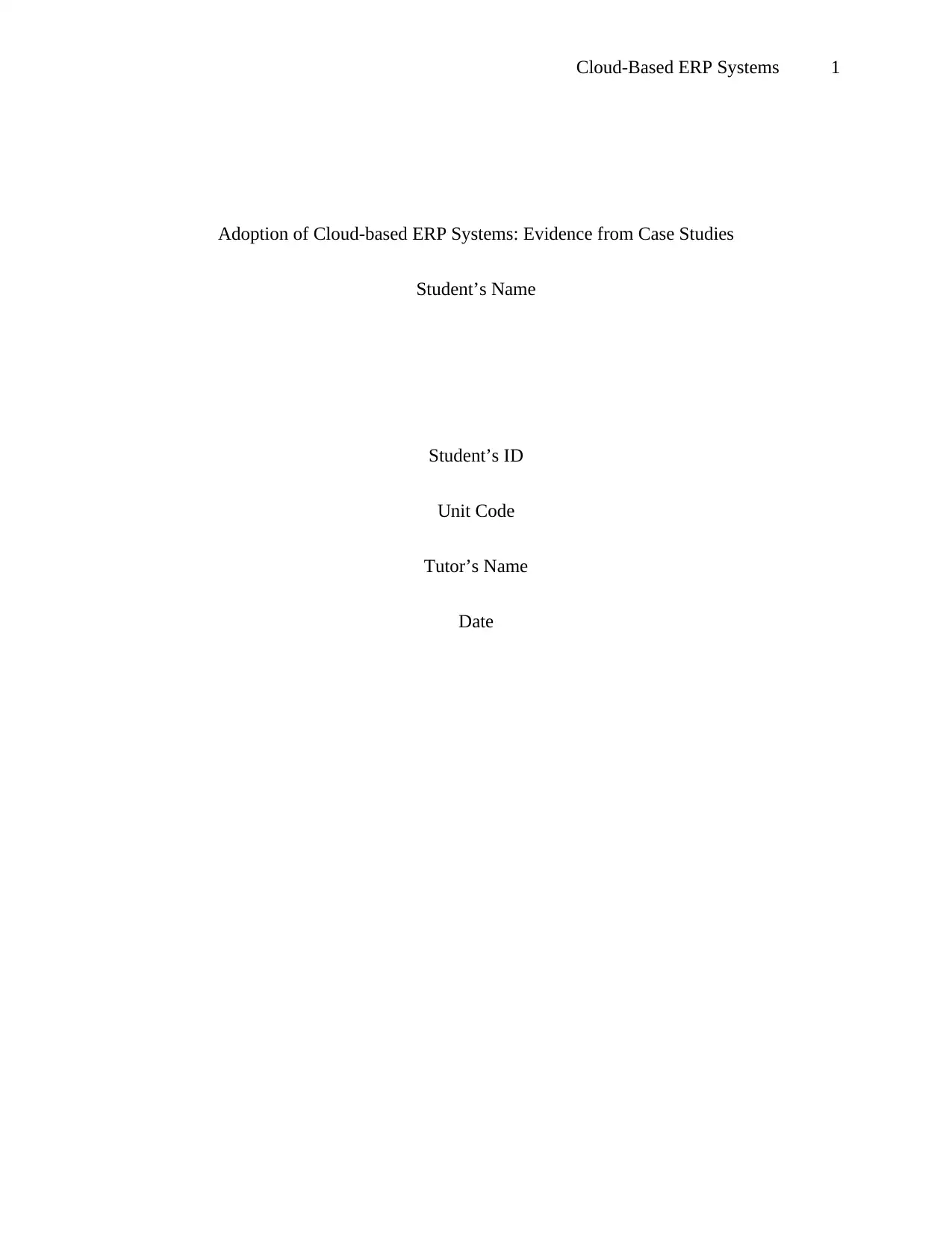
Cloud-Based ERP Systems 1
Adoption of Cloud-based ERP Systems: Evidence from Case Studies
Student’s Name
Student’s ID
Unit Code
Tutor’s Name
Date
Adoption of Cloud-based ERP Systems: Evidence from Case Studies
Student’s Name
Student’s ID
Unit Code
Tutor’s Name
Date
Paraphrase This Document
Need a fresh take? Get an instant paraphrase of this document with our AI Paraphraser
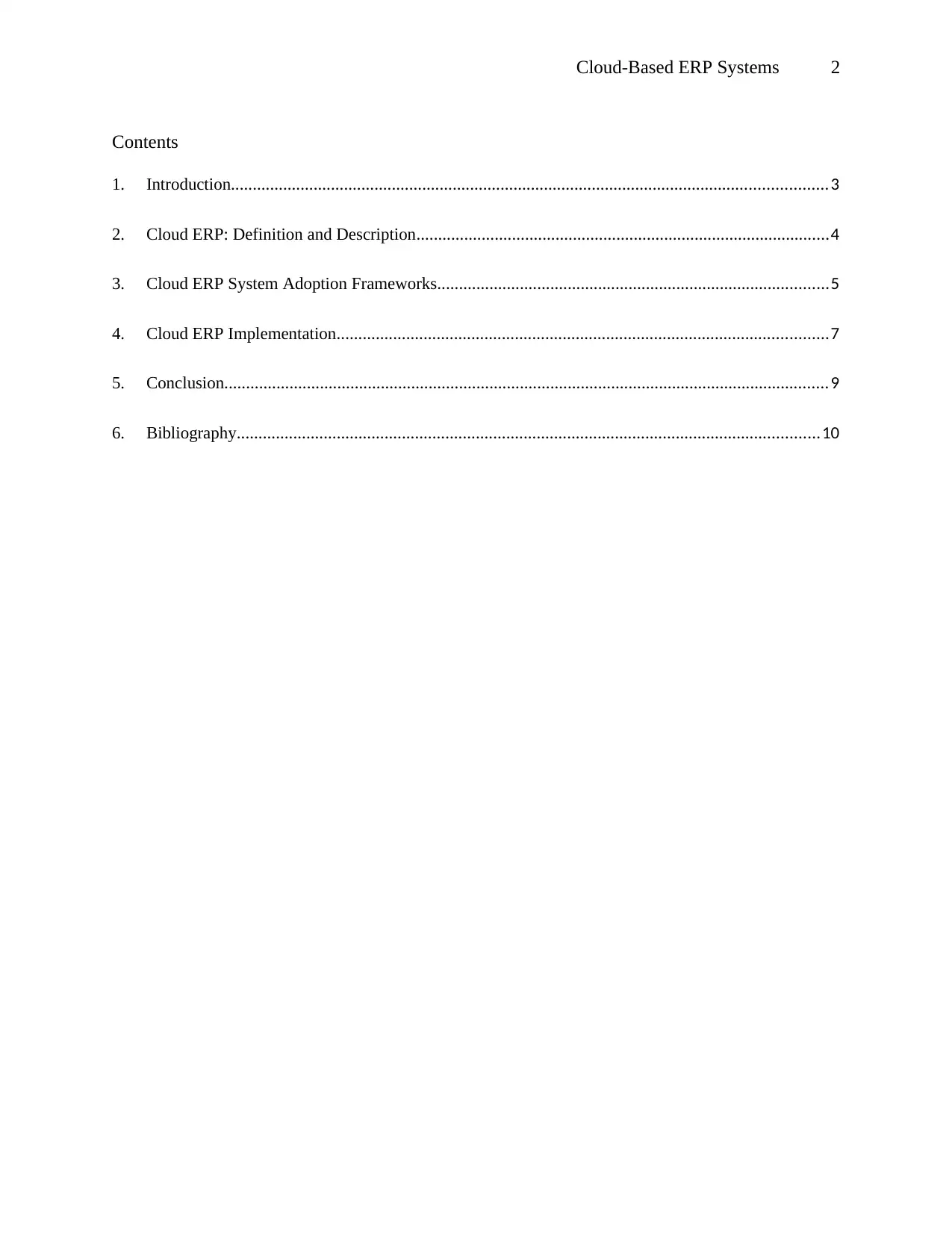
Cloud-Based ERP Systems 2
Contents
1. Introduction.........................................................................................................................................3
2. Cloud ERP: Definition and Description...............................................................................................4
3. Cloud ERP System Adoption Frameworks..........................................................................................5
4. Cloud ERP Implementation.................................................................................................................7
5. Conclusion...........................................................................................................................................9
6. Bibliography......................................................................................................................................10
Contents
1. Introduction.........................................................................................................................................3
2. Cloud ERP: Definition and Description...............................................................................................4
3. Cloud ERP System Adoption Frameworks..........................................................................................5
4. Cloud ERP Implementation.................................................................................................................7
5. Conclusion...........................................................................................................................................9
6. Bibliography......................................................................................................................................10
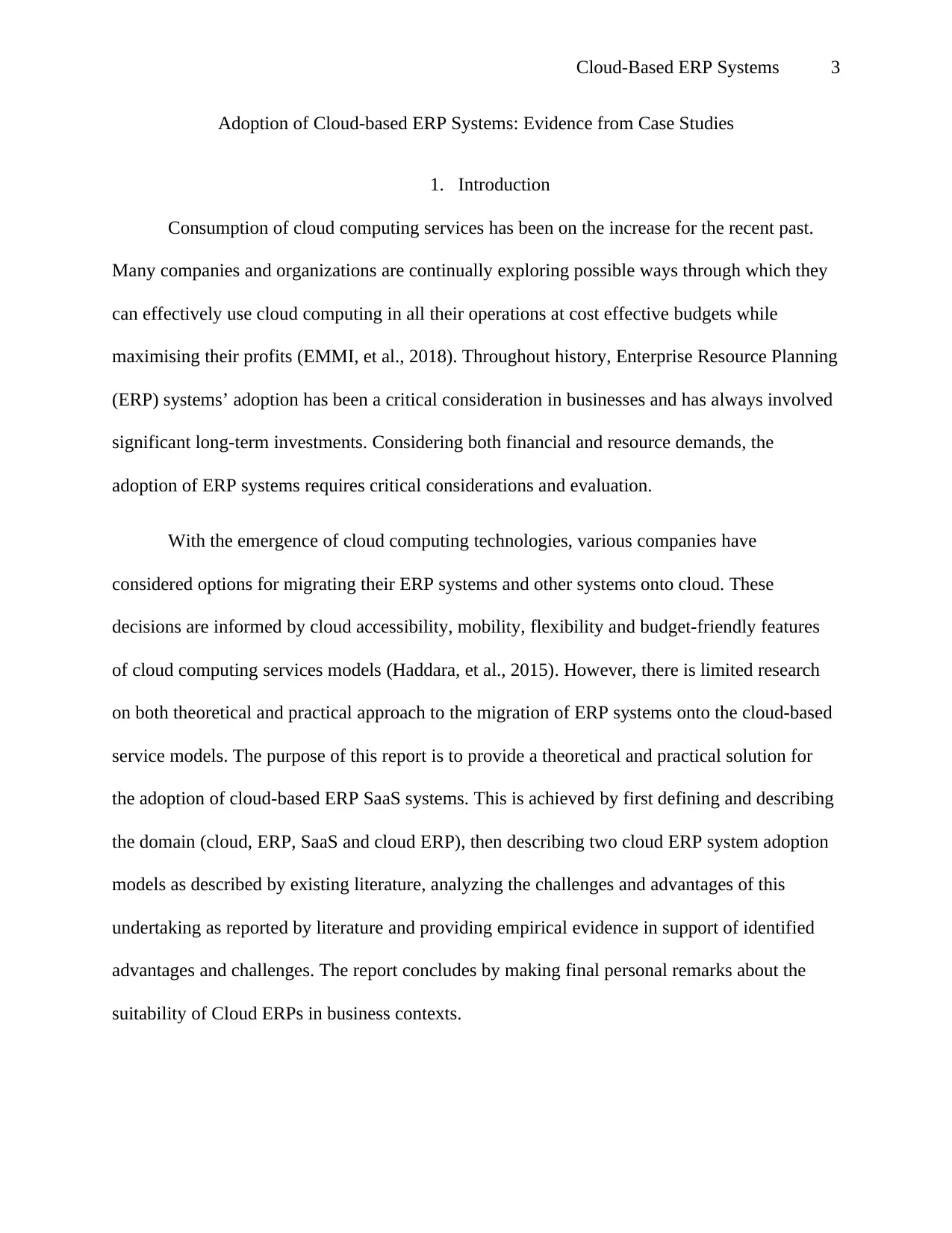
Cloud-Based ERP Systems 3
Adoption of Cloud-based ERP Systems: Evidence from Case Studies
1. Introduction
Consumption of cloud computing services has been on the increase for the recent past.
Many companies and organizations are continually exploring possible ways through which they
can effectively use cloud computing in all their operations at cost effective budgets while
maximising their profits (EMMI, et al., 2018). Throughout history, Enterprise Resource Planning
(ERP) systems’ adoption has been a critical consideration in businesses and has always involved
significant long-term investments. Considering both financial and resource demands, the
adoption of ERP systems requires critical considerations and evaluation.
With the emergence of cloud computing technologies, various companies have
considered options for migrating their ERP systems and other systems onto cloud. These
decisions are informed by cloud accessibility, mobility, flexibility and budget-friendly features
of cloud computing services models (Haddara, et al., 2015). However, there is limited research
on both theoretical and practical approach to the migration of ERP systems onto the cloud-based
service models. The purpose of this report is to provide a theoretical and practical solution for
the adoption of cloud-based ERP SaaS systems. This is achieved by first defining and describing
the domain (cloud, ERP, SaaS and cloud ERP), then describing two cloud ERP system adoption
models as described by existing literature, analyzing the challenges and advantages of this
undertaking as reported by literature and providing empirical evidence in support of identified
advantages and challenges. The report concludes by making final personal remarks about the
suitability of Cloud ERPs in business contexts.
Adoption of Cloud-based ERP Systems: Evidence from Case Studies
1. Introduction
Consumption of cloud computing services has been on the increase for the recent past.
Many companies and organizations are continually exploring possible ways through which they
can effectively use cloud computing in all their operations at cost effective budgets while
maximising their profits (EMMI, et al., 2018). Throughout history, Enterprise Resource Planning
(ERP) systems’ adoption has been a critical consideration in businesses and has always involved
significant long-term investments. Considering both financial and resource demands, the
adoption of ERP systems requires critical considerations and evaluation.
With the emergence of cloud computing technologies, various companies have
considered options for migrating their ERP systems and other systems onto cloud. These
decisions are informed by cloud accessibility, mobility, flexibility and budget-friendly features
of cloud computing services models (Haddara, et al., 2015). However, there is limited research
on both theoretical and practical approach to the migration of ERP systems onto the cloud-based
service models. The purpose of this report is to provide a theoretical and practical solution for
the adoption of cloud-based ERP SaaS systems. This is achieved by first defining and describing
the domain (cloud, ERP, SaaS and cloud ERP), then describing two cloud ERP system adoption
models as described by existing literature, analyzing the challenges and advantages of this
undertaking as reported by literature and providing empirical evidence in support of identified
advantages and challenges. The report concludes by making final personal remarks about the
suitability of Cloud ERPs in business contexts.
⊘ This is a preview!⊘
Do you want full access?
Subscribe today to unlock all pages.

Trusted by 1+ million students worldwide
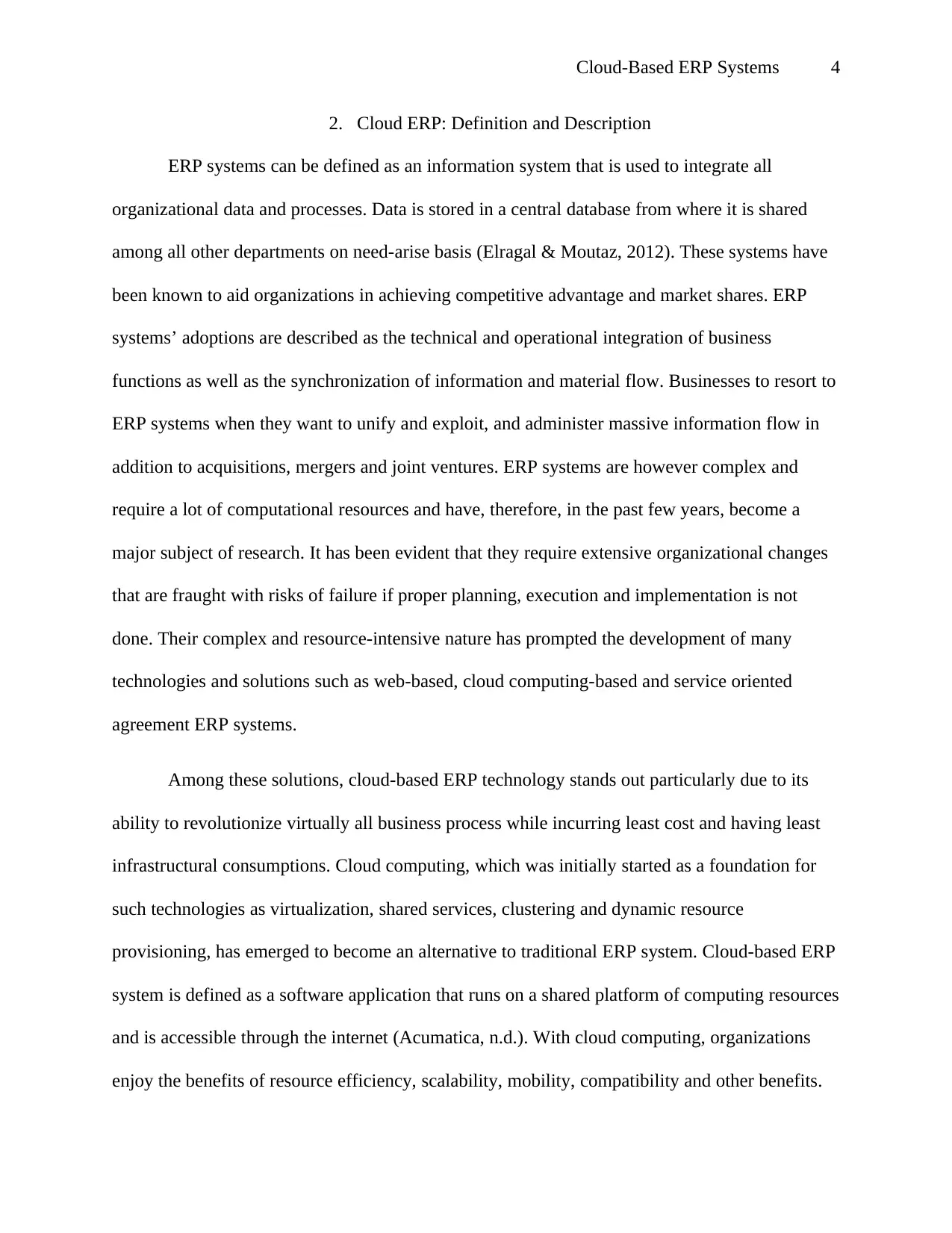
Cloud-Based ERP Systems 4
2. Cloud ERP: Definition and Description
ERP systems can be defined as an information system that is used to integrate all
organizational data and processes. Data is stored in a central database from where it is shared
among all other departments on need-arise basis (Elragal & Moutaz, 2012). These systems have
been known to aid organizations in achieving competitive advantage and market shares. ERP
systems’ adoptions are described as the technical and operational integration of business
functions as well as the synchronization of information and material flow. Businesses to resort to
ERP systems when they want to unify and exploit, and administer massive information flow in
addition to acquisitions, mergers and joint ventures. ERP systems are however complex and
require a lot of computational resources and have, therefore, in the past few years, become a
major subject of research. It has been evident that they require extensive organizational changes
that are fraught with risks of failure if proper planning, execution and implementation is not
done. Their complex and resource-intensive nature has prompted the development of many
technologies and solutions such as web-based, cloud computing-based and service oriented
agreement ERP systems.
Among these solutions, cloud-based ERP technology stands out particularly due to its
ability to revolutionize virtually all business process while incurring least cost and having least
infrastructural consumptions. Cloud computing, which was initially started as a foundation for
such technologies as virtualization, shared services, clustering and dynamic resource
provisioning, has emerged to become an alternative to traditional ERP system. Cloud-based ERP
system is defined as a software application that runs on a shared platform of computing resources
and is accessible through the internet (Acumatica, n.d.). With cloud computing, organizations
enjoy the benefits of resource efficiency, scalability, mobility, compatibility and other benefits.
2. Cloud ERP: Definition and Description
ERP systems can be defined as an information system that is used to integrate all
organizational data and processes. Data is stored in a central database from where it is shared
among all other departments on need-arise basis (Elragal & Moutaz, 2012). These systems have
been known to aid organizations in achieving competitive advantage and market shares. ERP
systems’ adoptions are described as the technical and operational integration of business
functions as well as the synchronization of information and material flow. Businesses to resort to
ERP systems when they want to unify and exploit, and administer massive information flow in
addition to acquisitions, mergers and joint ventures. ERP systems are however complex and
require a lot of computational resources and have, therefore, in the past few years, become a
major subject of research. It has been evident that they require extensive organizational changes
that are fraught with risks of failure if proper planning, execution and implementation is not
done. Their complex and resource-intensive nature has prompted the development of many
technologies and solutions such as web-based, cloud computing-based and service oriented
agreement ERP systems.
Among these solutions, cloud-based ERP technology stands out particularly due to its
ability to revolutionize virtually all business process while incurring least cost and having least
infrastructural consumptions. Cloud computing, which was initially started as a foundation for
such technologies as virtualization, shared services, clustering and dynamic resource
provisioning, has emerged to become an alternative to traditional ERP system. Cloud-based ERP
system is defined as a software application that runs on a shared platform of computing resources
and is accessible through the internet (Acumatica, n.d.). With cloud computing, organizations
enjoy the benefits of resource efficiency, scalability, mobility, compatibility and other benefits.
Paraphrase This Document
Need a fresh take? Get an instant paraphrase of this document with our AI Paraphraser
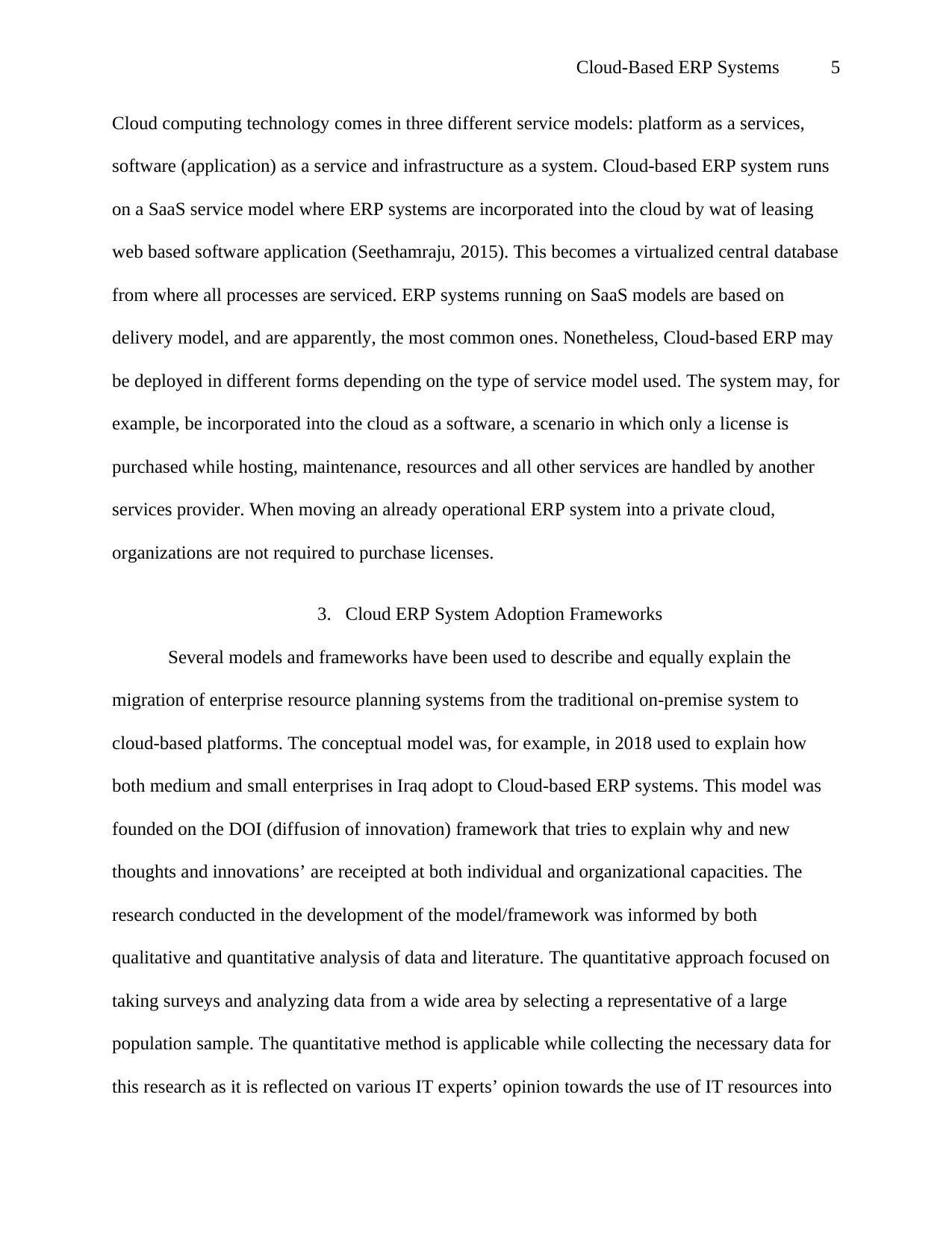
Cloud-Based ERP Systems 5
Cloud computing technology comes in three different service models: platform as a services,
software (application) as a service and infrastructure as a system. Cloud-based ERP system runs
on a SaaS service model where ERP systems are incorporated into the cloud by wat of leasing
web based software application (Seethamraju, 2015). This becomes a virtualized central database
from where all processes are serviced. ERP systems running on SaaS models are based on
delivery model, and are apparently, the most common ones. Nonetheless, Cloud-based ERP may
be deployed in different forms depending on the type of service model used. The system may, for
example, be incorporated into the cloud as a software, a scenario in which only a license is
purchased while hosting, maintenance, resources and all other services are handled by another
services provider. When moving an already operational ERP system into a private cloud,
organizations are not required to purchase licenses.
3. Cloud ERP System Adoption Frameworks
Several models and frameworks have been used to describe and equally explain the
migration of enterprise resource planning systems from the traditional on-premise system to
cloud-based platforms. The conceptual model was, for example, in 2018 used to explain how
both medium and small enterprises in Iraq adopt to Cloud-based ERP systems. This model was
founded on the DOI (diffusion of innovation) framework that tries to explain why and new
thoughts and innovations’ are receipted at both individual and organizational capacities. The
research conducted in the development of the model/framework was informed by both
qualitative and quantitative analysis of data and literature. The quantitative approach focused on
taking surveys and analyzing data from a wide area by selecting a representative of a large
population sample. The quantitative method is applicable while collecting the necessary data for
this research as it is reflected on various IT experts’ opinion towards the use of IT resources into
Cloud computing technology comes in three different service models: platform as a services,
software (application) as a service and infrastructure as a system. Cloud-based ERP system runs
on a SaaS service model where ERP systems are incorporated into the cloud by wat of leasing
web based software application (Seethamraju, 2015). This becomes a virtualized central database
from where all processes are serviced. ERP systems running on SaaS models are based on
delivery model, and are apparently, the most common ones. Nonetheless, Cloud-based ERP may
be deployed in different forms depending on the type of service model used. The system may, for
example, be incorporated into the cloud as a software, a scenario in which only a license is
purchased while hosting, maintenance, resources and all other services are handled by another
services provider. When moving an already operational ERP system into a private cloud,
organizations are not required to purchase licenses.
3. Cloud ERP System Adoption Frameworks
Several models and frameworks have been used to describe and equally explain the
migration of enterprise resource planning systems from the traditional on-premise system to
cloud-based platforms. The conceptual model was, for example, in 2018 used to explain how
both medium and small enterprises in Iraq adopt to Cloud-based ERP systems. This model was
founded on the DOI (diffusion of innovation) framework that tries to explain why and new
thoughts and innovations’ are receipted at both individual and organizational capacities. The
research conducted in the development of the model/framework was informed by both
qualitative and quantitative analysis of data and literature. The quantitative approach focused on
taking surveys and analyzing data from a wide area by selecting a representative of a large
population sample. The quantitative method is applicable while collecting the necessary data for
this research as it is reflected on various IT experts’ opinion towards the use of IT resources into
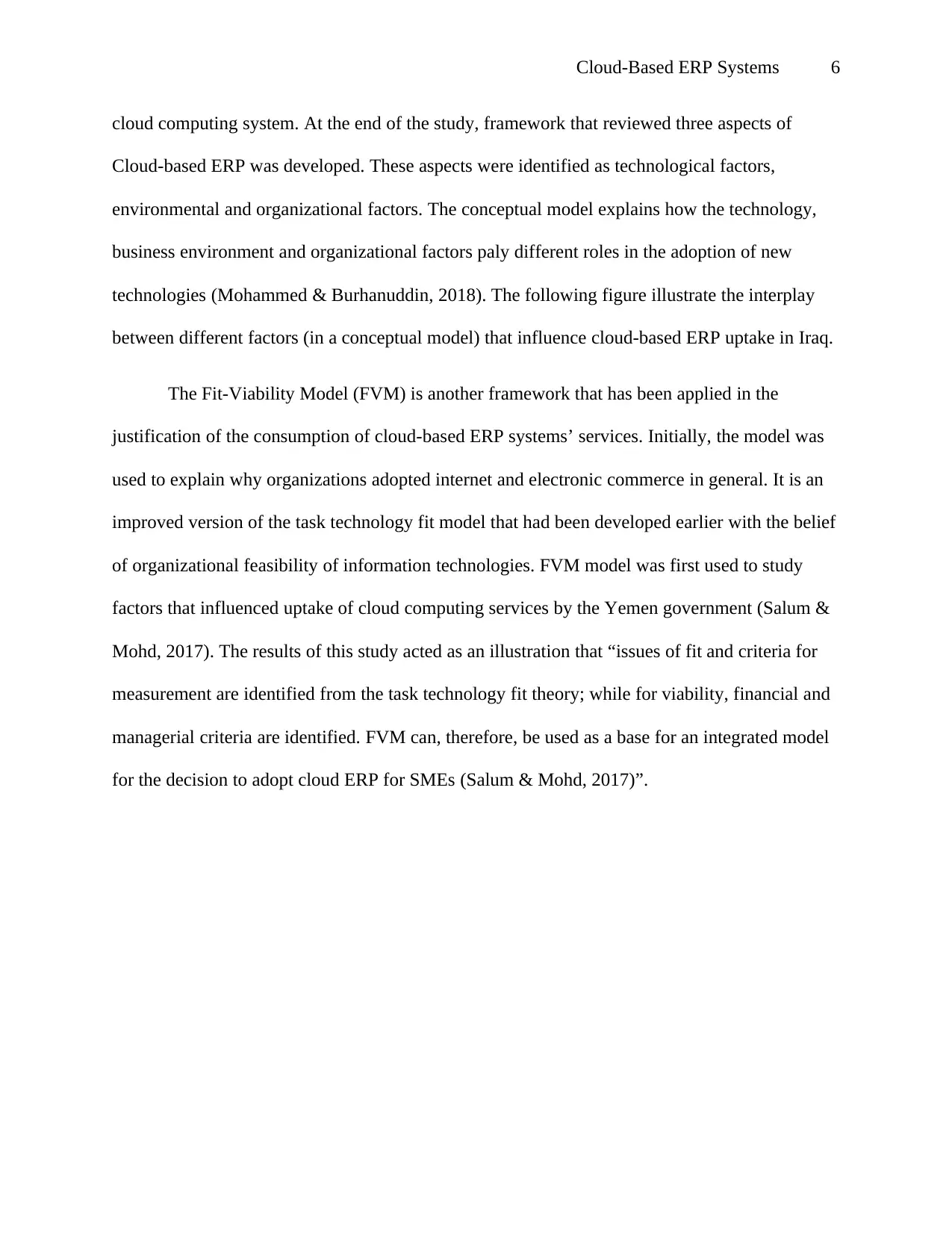
Cloud-Based ERP Systems 6
cloud computing system. At the end of the study, framework that reviewed three aspects of
Cloud-based ERP was developed. These aspects were identified as technological factors,
environmental and organizational factors. The conceptual model explains how the technology,
business environment and organizational factors paly different roles in the adoption of new
technologies (Mohammed & Burhanuddin, 2018). The following figure illustrate the interplay
between different factors (in a conceptual model) that influence cloud-based ERP uptake in Iraq.
The Fit-Viability Model (FVM) is another framework that has been applied in the
justification of the consumption of cloud-based ERP systems’ services. Initially, the model was
used to explain why organizations adopted internet and electronic commerce in general. It is an
improved version of the task technology fit model that had been developed earlier with the belief
of organizational feasibility of information technologies. FVM model was first used to study
factors that influenced uptake of cloud computing services by the Yemen government (Salum &
Mohd, 2017). The results of this study acted as an illustration that “issues of fit and criteria for
measurement are identified from the task technology fit theory; while for viability, financial and
managerial criteria are identified. FVM can, therefore, be used as a base for an integrated model
for the decision to adopt cloud ERP for SMEs (Salum & Mohd, 2017)”.
cloud computing system. At the end of the study, framework that reviewed three aspects of
Cloud-based ERP was developed. These aspects were identified as technological factors,
environmental and organizational factors. The conceptual model explains how the technology,
business environment and organizational factors paly different roles in the adoption of new
technologies (Mohammed & Burhanuddin, 2018). The following figure illustrate the interplay
between different factors (in a conceptual model) that influence cloud-based ERP uptake in Iraq.
The Fit-Viability Model (FVM) is another framework that has been applied in the
justification of the consumption of cloud-based ERP systems’ services. Initially, the model was
used to explain why organizations adopted internet and electronic commerce in general. It is an
improved version of the task technology fit model that had been developed earlier with the belief
of organizational feasibility of information technologies. FVM model was first used to study
factors that influenced uptake of cloud computing services by the Yemen government (Salum &
Mohd, 2017). The results of this study acted as an illustration that “issues of fit and criteria for
measurement are identified from the task technology fit theory; while for viability, financial and
managerial criteria are identified. FVM can, therefore, be used as a base for an integrated model
for the decision to adopt cloud ERP for SMEs (Salum & Mohd, 2017)”.
⊘ This is a preview!⊘
Do you want full access?
Subscribe today to unlock all pages.

Trusted by 1+ million students worldwide
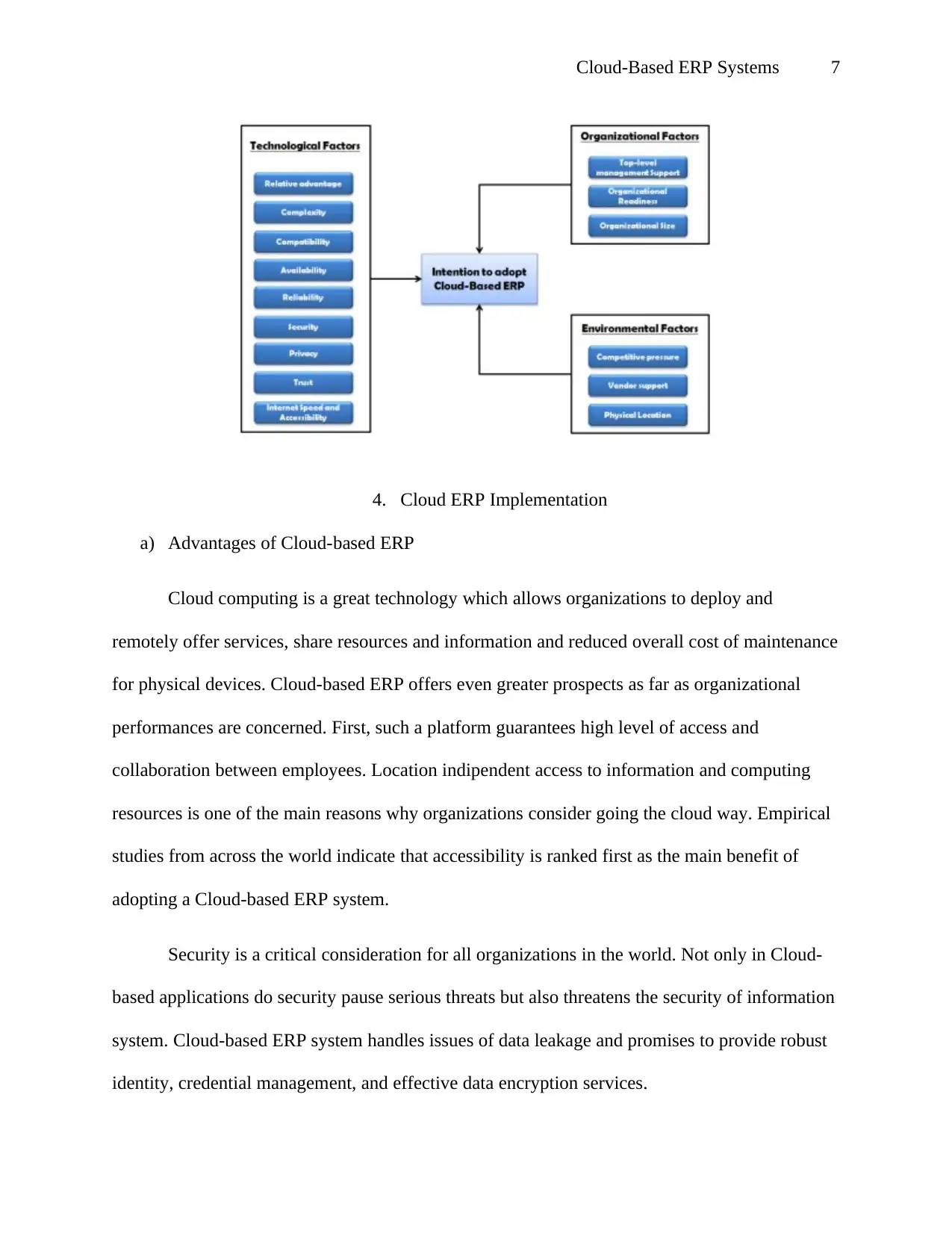
Cloud-Based ERP Systems 7
4. Cloud ERP Implementation
a) Advantages of Cloud-based ERP
Cloud computing is a great technology which allows organizations to deploy and
remotely offer services, share resources and information and reduced overall cost of maintenance
for physical devices. Cloud-based ERP offers even greater prospects as far as organizational
performances are concerned. First, such a platform guarantees high level of access and
collaboration between employees. Location indipendent access to information and computing
resources is one of the main reasons why organizations consider going the cloud way. Empirical
studies from across the world indicate that accessibility is ranked first as the main benefit of
adopting a Cloud-based ERP system.
Security is a critical consideration for all organizations in the world. Not only in Cloud-
based applications do security pause serious threats but also threatens the security of information
system. Cloud-based ERP system handles issues of data leakage and promises to provide robust
identity, credential management, and effective data encryption services.
4. Cloud ERP Implementation
a) Advantages of Cloud-based ERP
Cloud computing is a great technology which allows organizations to deploy and
remotely offer services, share resources and information and reduced overall cost of maintenance
for physical devices. Cloud-based ERP offers even greater prospects as far as organizational
performances are concerned. First, such a platform guarantees high level of access and
collaboration between employees. Location indipendent access to information and computing
resources is one of the main reasons why organizations consider going the cloud way. Empirical
studies from across the world indicate that accessibility is ranked first as the main benefit of
adopting a Cloud-based ERP system.
Security is a critical consideration for all organizations in the world. Not only in Cloud-
based applications do security pause serious threats but also threatens the security of information
system. Cloud-based ERP system handles issues of data leakage and promises to provide robust
identity, credential management, and effective data encryption services.
Paraphrase This Document
Need a fresh take? Get an instant paraphrase of this document with our AI Paraphraser
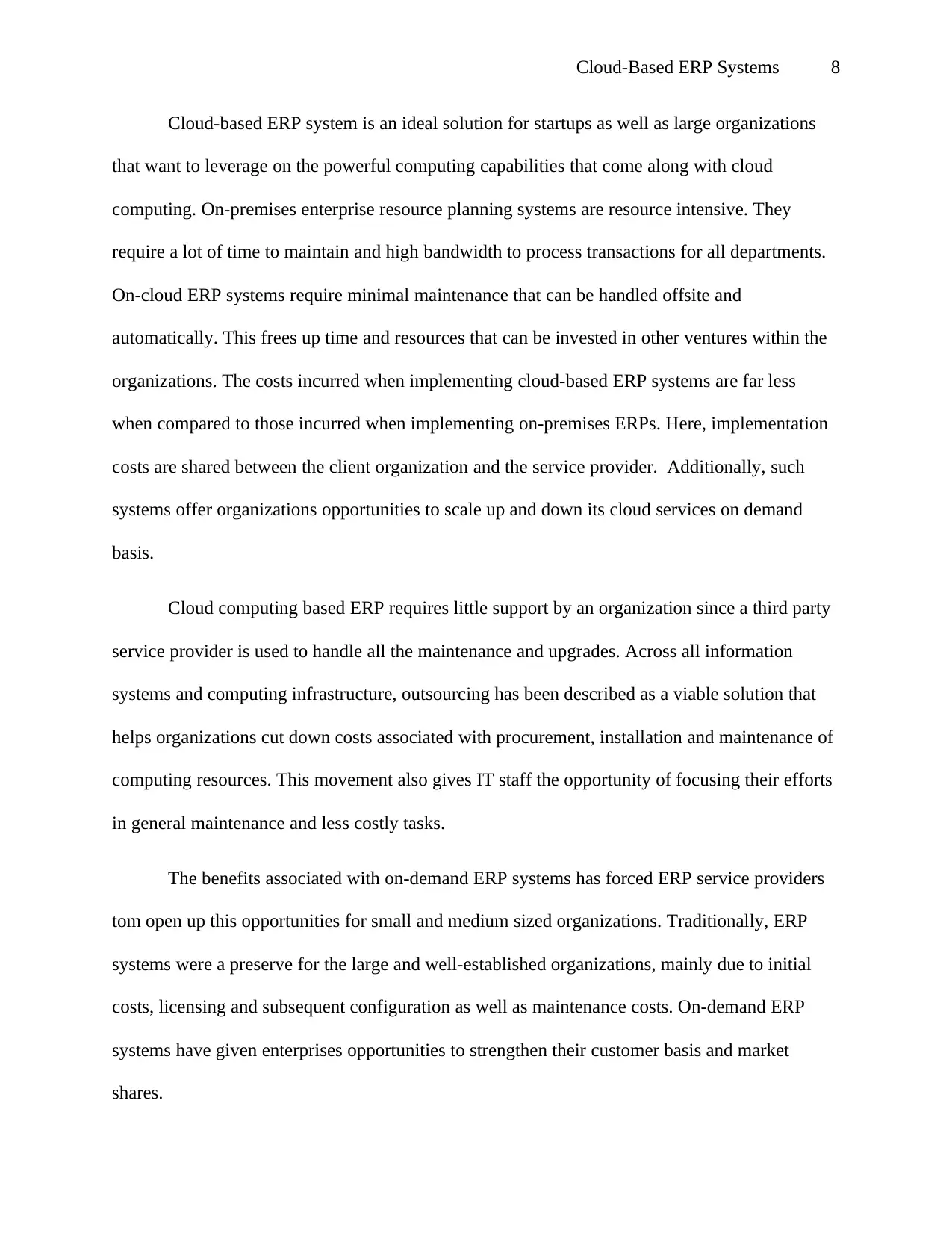
Cloud-Based ERP Systems 8
Cloud-based ERP system is an ideal solution for startups as well as large organizations
that want to leverage on the powerful computing capabilities that come along with cloud
computing. On-premises enterprise resource planning systems are resource intensive. They
require a lot of time to maintain and high bandwidth to process transactions for all departments.
On-cloud ERP systems require minimal maintenance that can be handled offsite and
automatically. This frees up time and resources that can be invested in other ventures within the
organizations. The costs incurred when implementing cloud-based ERP systems are far less
when compared to those incurred when implementing on-premises ERPs. Here, implementation
costs are shared between the client organization and the service provider. Additionally, such
systems offer organizations opportunities to scale up and down its cloud services on demand
basis.
Cloud computing based ERP requires little support by an organization since a third party
service provider is used to handle all the maintenance and upgrades. Across all information
systems and computing infrastructure, outsourcing has been described as a viable solution that
helps organizations cut down costs associated with procurement, installation and maintenance of
computing resources. This movement also gives IT staff the opportunity of focusing their efforts
in general maintenance and less costly tasks.
The benefits associated with on-demand ERP systems has forced ERP service providers
tom open up this opportunities for small and medium sized organizations. Traditionally, ERP
systems were a preserve for the large and well-established organizations, mainly due to initial
costs, licensing and subsequent configuration as well as maintenance costs. On-demand ERP
systems have given enterprises opportunities to strengthen their customer basis and market
shares.
Cloud-based ERP system is an ideal solution for startups as well as large organizations
that want to leverage on the powerful computing capabilities that come along with cloud
computing. On-premises enterprise resource planning systems are resource intensive. They
require a lot of time to maintain and high bandwidth to process transactions for all departments.
On-cloud ERP systems require minimal maintenance that can be handled offsite and
automatically. This frees up time and resources that can be invested in other ventures within the
organizations. The costs incurred when implementing cloud-based ERP systems are far less
when compared to those incurred when implementing on-premises ERPs. Here, implementation
costs are shared between the client organization and the service provider. Additionally, such
systems offer organizations opportunities to scale up and down its cloud services on demand
basis.
Cloud computing based ERP requires little support by an organization since a third party
service provider is used to handle all the maintenance and upgrades. Across all information
systems and computing infrastructure, outsourcing has been described as a viable solution that
helps organizations cut down costs associated with procurement, installation and maintenance of
computing resources. This movement also gives IT staff the opportunity of focusing their efforts
in general maintenance and less costly tasks.
The benefits associated with on-demand ERP systems has forced ERP service providers
tom open up this opportunities for small and medium sized organizations. Traditionally, ERP
systems were a preserve for the large and well-established organizations, mainly due to initial
costs, licensing and subsequent configuration as well as maintenance costs. On-demand ERP
systems have given enterprises opportunities to strengthen their customer basis and market
shares.
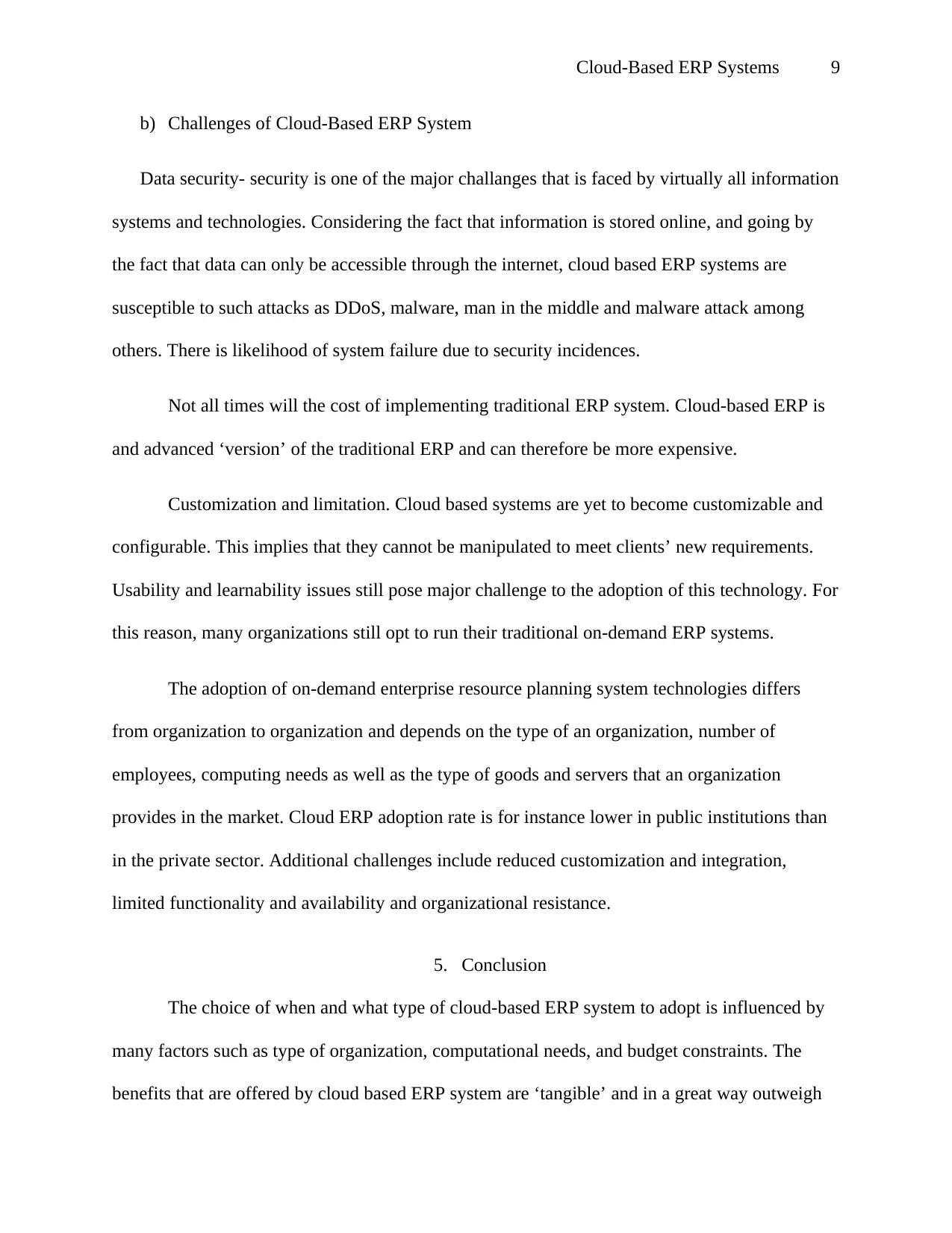
Cloud-Based ERP Systems 9
b) Challenges of Cloud-Based ERP System
Data security- security is one of the major challanges that is faced by virtually all information
systems and technologies. Considering the fact that information is stored online, and going by
the fact that data can only be accessible through the internet, cloud based ERP systems are
susceptible to such attacks as DDoS, malware, man in the middle and malware attack among
others. There is likelihood of system failure due to security incidences.
Not all times will the cost of implementing traditional ERP system. Cloud-based ERP is
and advanced ‘version’ of the traditional ERP and can therefore be more expensive.
Customization and limitation. Cloud based systems are yet to become customizable and
configurable. This implies that they cannot be manipulated to meet clients’ new requirements.
Usability and learnability issues still pose major challenge to the adoption of this technology. For
this reason, many organizations still opt to run their traditional on-demand ERP systems.
The adoption of on-demand enterprise resource planning system technologies differs
from organization to organization and depends on the type of an organization, number of
employees, computing needs as well as the type of goods and servers that an organization
provides in the market. Cloud ERP adoption rate is for instance lower in public institutions than
in the private sector. Additional challenges include reduced customization and integration,
limited functionality and availability and organizational resistance.
5. Conclusion
The choice of when and what type of cloud-based ERP system to adopt is influenced by
many factors such as type of organization, computational needs, and budget constraints. The
benefits that are offered by cloud based ERP system are ‘tangible’ and in a great way outweigh
b) Challenges of Cloud-Based ERP System
Data security- security is one of the major challanges that is faced by virtually all information
systems and technologies. Considering the fact that information is stored online, and going by
the fact that data can only be accessible through the internet, cloud based ERP systems are
susceptible to such attacks as DDoS, malware, man in the middle and malware attack among
others. There is likelihood of system failure due to security incidences.
Not all times will the cost of implementing traditional ERP system. Cloud-based ERP is
and advanced ‘version’ of the traditional ERP and can therefore be more expensive.
Customization and limitation. Cloud based systems are yet to become customizable and
configurable. This implies that they cannot be manipulated to meet clients’ new requirements.
Usability and learnability issues still pose major challenge to the adoption of this technology. For
this reason, many organizations still opt to run their traditional on-demand ERP systems.
The adoption of on-demand enterprise resource planning system technologies differs
from organization to organization and depends on the type of an organization, number of
employees, computing needs as well as the type of goods and servers that an organization
provides in the market. Cloud ERP adoption rate is for instance lower in public institutions than
in the private sector. Additional challenges include reduced customization and integration,
limited functionality and availability and organizational resistance.
5. Conclusion
The choice of when and what type of cloud-based ERP system to adopt is influenced by
many factors such as type of organization, computational needs, and budget constraints. The
benefits that are offered by cloud based ERP system are ‘tangible’ and in a great way outweigh
⊘ This is a preview!⊘
Do you want full access?
Subscribe today to unlock all pages.

Trusted by 1+ million students worldwide
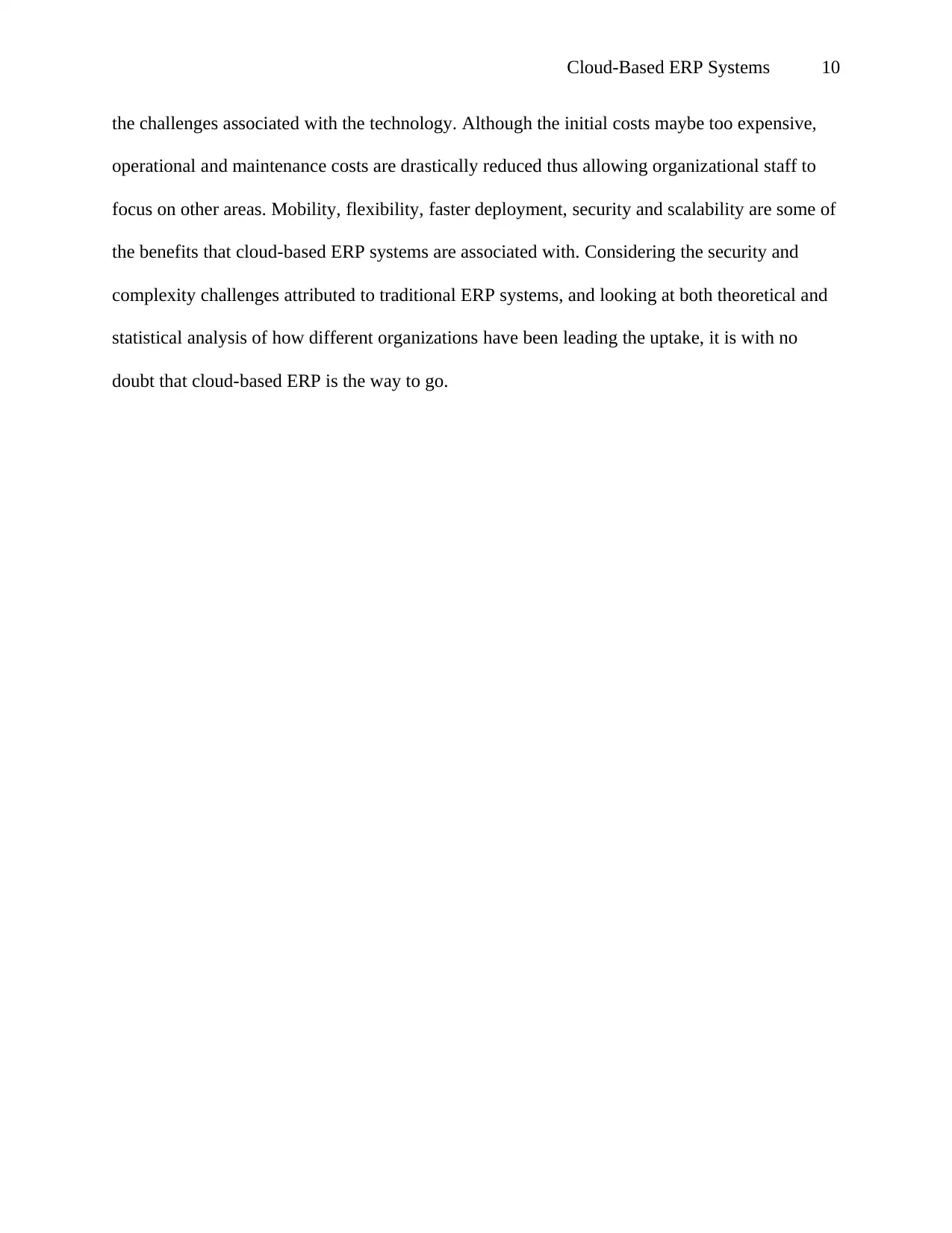
Cloud-Based ERP Systems 10
the challenges associated with the technology. Although the initial costs maybe too expensive,
operational and maintenance costs are drastically reduced thus allowing organizational staff to
focus on other areas. Mobility, flexibility, faster deployment, security and scalability are some of
the benefits that cloud-based ERP systems are associated with. Considering the security and
complexity challenges attributed to traditional ERP systems, and looking at both theoretical and
statistical analysis of how different organizations have been leading the uptake, it is with no
doubt that cloud-based ERP is the way to go.
the challenges associated with the technology. Although the initial costs maybe too expensive,
operational and maintenance costs are drastically reduced thus allowing organizational staff to
focus on other areas. Mobility, flexibility, faster deployment, security and scalability are some of
the benefits that cloud-based ERP systems are associated with. Considering the security and
complexity challenges attributed to traditional ERP systems, and looking at both theoretical and
statistical analysis of how different organizations have been leading the uptake, it is with no
doubt that cloud-based ERP is the way to go.
Paraphrase This Document
Need a fresh take? Get an instant paraphrase of this document with our AI Paraphraser
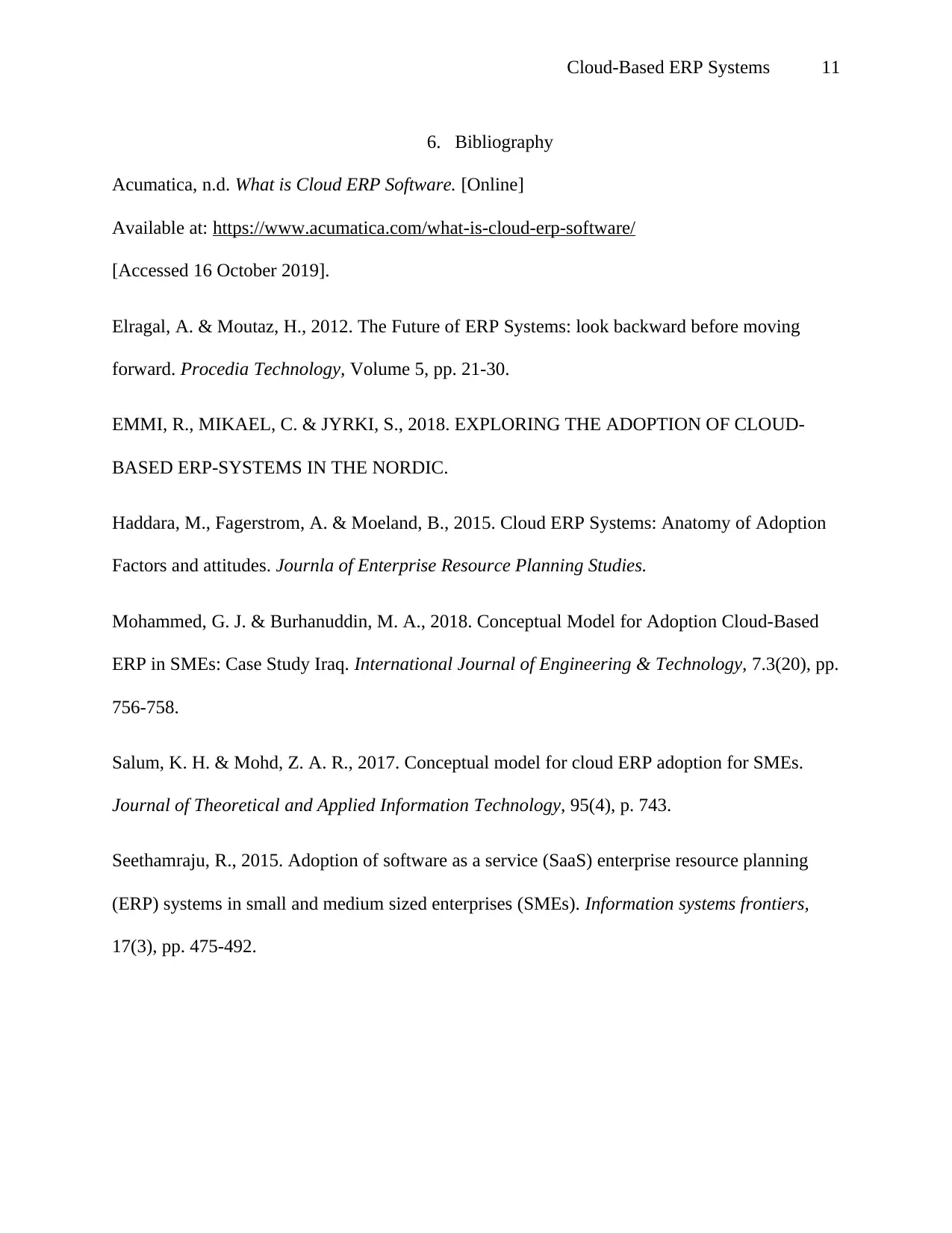
Cloud-Based ERP Systems 11
6. Bibliography
Acumatica, n.d. What is Cloud ERP Software. [Online]
Available at: https://www.acumatica.com/what-is-cloud-erp-software/
[Accessed 16 October 2019].
Elragal, A. & Moutaz, H., 2012. The Future of ERP Systems: look backward before moving
forward. Procedia Technology, Volume 5, pp. 21-30.
EMMI, R., MIKAEL, C. & JYRKI, S., 2018. EXPLORING THE ADOPTION OF CLOUD-
BASED ERP-SYSTEMS IN THE NORDIC.
Haddara, M., Fagerstrom, A. & Moeland, B., 2015. Cloud ERP Systems: Anatomy of Adoption
Factors and attitudes. Journla of Enterprise Resource Planning Studies.
Mohammed, G. J. & Burhanuddin, M. A., 2018. Conceptual Model for Adoption Cloud-Based
ERP in SMEs: Case Study Iraq. International Journal of Engineering & Technology, 7.3(20), pp.
756-758.
Salum, K. H. & Mohd, Z. A. R., 2017. Conceptual model for cloud ERP adoption for SMEs.
Journal of Theoretical and Applied Information Technology, 95(4), p. 743.
Seethamraju, R., 2015. Adoption of software as a service (SaaS) enterprise resource planning
(ERP) systems in small and medium sized enterprises (SMEs). Information systems frontiers,
17(3), pp. 475-492.
6. Bibliography
Acumatica, n.d. What is Cloud ERP Software. [Online]
Available at: https://www.acumatica.com/what-is-cloud-erp-software/
[Accessed 16 October 2019].
Elragal, A. & Moutaz, H., 2012. The Future of ERP Systems: look backward before moving
forward. Procedia Technology, Volume 5, pp. 21-30.
EMMI, R., MIKAEL, C. & JYRKI, S., 2018. EXPLORING THE ADOPTION OF CLOUD-
BASED ERP-SYSTEMS IN THE NORDIC.
Haddara, M., Fagerstrom, A. & Moeland, B., 2015. Cloud ERP Systems: Anatomy of Adoption
Factors and attitudes. Journla of Enterprise Resource Planning Studies.
Mohammed, G. J. & Burhanuddin, M. A., 2018. Conceptual Model for Adoption Cloud-Based
ERP in SMEs: Case Study Iraq. International Journal of Engineering & Technology, 7.3(20), pp.
756-758.
Salum, K. H. & Mohd, Z. A. R., 2017. Conceptual model for cloud ERP adoption for SMEs.
Journal of Theoretical and Applied Information Technology, 95(4), p. 743.
Seethamraju, R., 2015. Adoption of software as a service (SaaS) enterprise resource planning
(ERP) systems in small and medium sized enterprises (SMEs). Information systems frontiers,
17(3), pp. 475-492.
1 out of 11
Related Documents
Your All-in-One AI-Powered Toolkit for Academic Success.
+13062052269
info@desklib.com
Available 24*7 on WhatsApp / Email
![[object Object]](/_next/static/media/star-bottom.7253800d.svg)
Unlock your academic potential
Copyright © 2020–2026 A2Z Services. All Rights Reserved. Developed and managed by ZUCOL.





